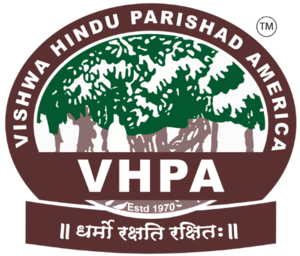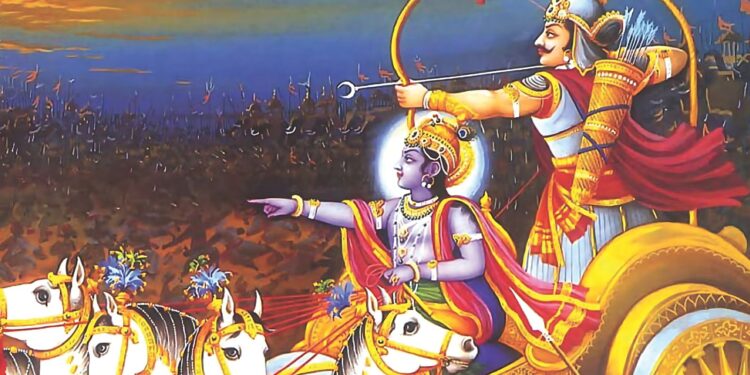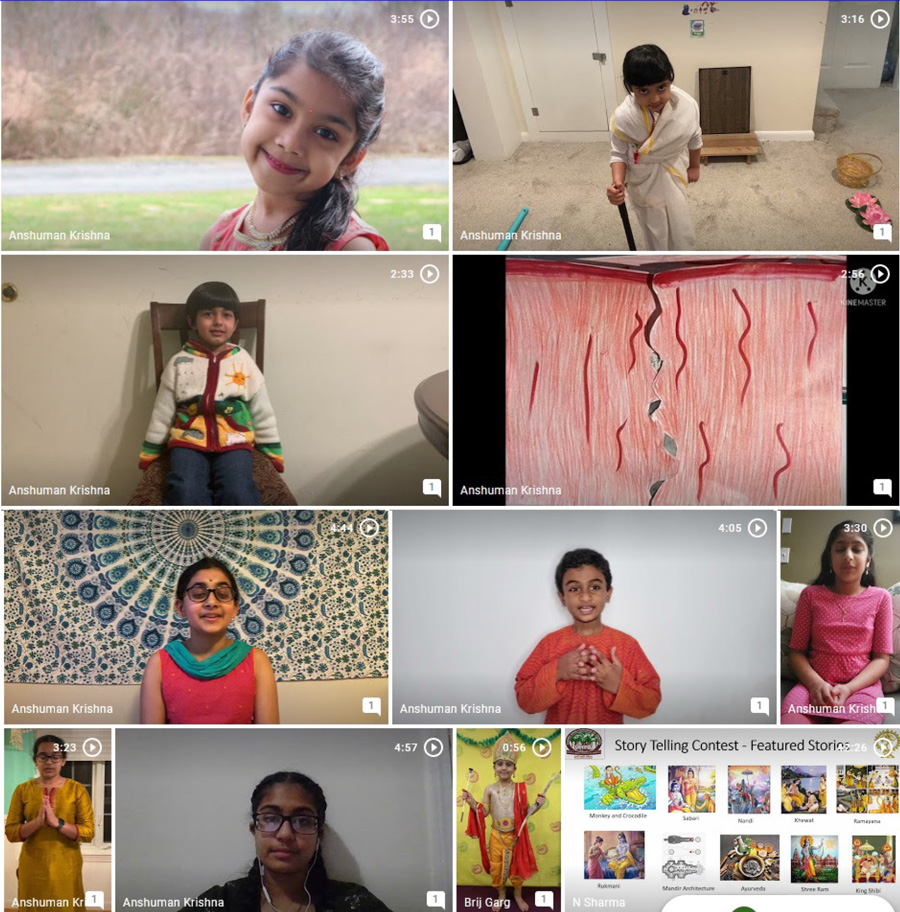Chapter 1 and 2 Summary
Last time we discussed Shloke 70 of 2nd chapter, which completes the 2nd chapter. Today we will revise the first and second chapters.
The first chapter is called Arjun Vishaad Yog. The key word here is Vishaad, which means depression, not being happy, not feeling well mentally. That mental state is called Vishaad. Before the war started, Arjun went into a depression.
The second word we talked about is Moh, which means delusion or confusion. We all go through that state sometimes. Some days we get confused, we cannot decide what to do. As we grow, the confusion grows within us. The purpose of study is to get knowledge so that there is no confusion. That is why Bhagwad Geeta is still relevant today.
So, we see that the two key words in the first chapter are vishaad or depression, and moh or confusion.
The second chapter is Sankhya Yog. Sankhya means knowledge. T his chapter is very important, once we understand it, the rest of the Geeta becomes easier.
Chapter 2 Shloke 7
kārpaṇya-doṣhopahata-svabhāvaḥ pṛichchhāmi tvāṁ dharma sammūḍha-chetāḥ yach-chhreyaḥ syānniśhchitaṁ brūhi tanme śhiṣhyaste ’haṁ śhādhi māṁ tvāṁ prapannam
With my very being smitten by the vice of faint-heartedness and my mind puzzled with regard to duty, I beseech you! Tell me that which is decidedly good; I am your disciple. Pray, instruct me, who have taken refuge in you.
This shlok is a Prarthana. Prarthana is sometimes described as prayer, but it is much more than prayer; it is a request with Shraddha (dedication and commitment) and Shreyas, which is good for all.
What do we do when we want a solution to some problem? We go to our parents and do a Prarthana, which we can call a request with surrender. Arjun went to Bhagwan Krishna to find the solution. He did Prarthana to Krishna to help him find the solution.
Arjun says: I am doing this Prarthana, I am puzzled, guide me, tell me the right path, which is Shreyas (what is good for all.)
Bhagwan gives him fundamental (basic) knowledge.
Shloke 23
nainaṁ chhindanti śhastrāṇi nainaṁ dahati pāvakaḥ na chainaṁ kledayantyāpo na śhoṣhayati mārutaḥ
Weapons cannot cut the Self, nor can fire burn it; water cannot wet it, nor can wind dry it.
This is Atma-gyan (Self knowledge). You are not this body, you are the Atma, you cannot be hurt by anything. Atma cannot be cut by any weapon or burnt by fire. Atma is invincible. Atma is always happy. That is my core nature.
Shloke 48
yoga-sthaḥ kuru karmāṇi saṅgaṁ tyaktvā dhanañjaya siddhy-asiddhyoḥ samo bhūtvā samatvaṁ yoga uchyate
Arjun, perform your duties established in Yog, renouncing attachment, and be even-minded in success and failure; evenness of mind is called “Yog”.
When you give up attachments and are even-minded, that is Samatwam, balanced in all situations. The Buddhi (mind) is balanced. When Buddhi (the mind) is balanced, that is called Karma Yog.
When you ride a bike, you first learn how to balance, so that you do not fall on either side. Similarly, the act of balancing the Buddhi is Karma Yog. When Buddhi is focused on the action, that is Karma Yog.
Karma Yog is the right action, right duty, the action which helps you to unite with Bhagwan.
The last thing we saw in this chapter is “Sthit Pragya”.
Shloke 55
prajahāti yadā kāmān sarvān pārtha mano-gatān ātmany-evātmanā tuṣhṭaḥ sthita prajñas tadochyate
Arjun, when one thoroughly casts off all cravings of the mind and is satisfied in the Self through the joy of the Self, then he is called stable of mind. When Buddhi wanders around, you will fall.
When Buddhi collapses, everything collapses. Buddhi has to be balanced. So, when one is stable of mind, one is Sthit-Pragya, One who doesn’t get disturbed and is stable.
Shloke 70
This summarizes the whole teaching of Stith Pragya. Āpūryamāṇam achala pratiṣhṭhaṁ, samudram āpaḥ praviśhanti yadvat tadvat kāmā yaṁ praviśhanti sarve, sa śhāntim āpnoti na kāma-kāmī
As the waters of different rivers enter the ocean, which, though full on all sides, remains undisturbed; likewise, he in whom all enjoyments merge themselves without causing disturbance attains peace; not he who hankers after such enjoyments.
All the rivers fall into the ocean, but the ocean is undisturbed. The quality of ocean is Achal Pratishtham, meaning it is calm, it is not disturbed. All the rivers, all the dirt, everything comes into the ocean, but the ocean just absorbs everything and does not get disturbed. It purifies everything, it creates clouds, rain. We should be like the ocean and not let things disturb us. Similarly, things come from all sides, but we should not be disturbed. How do we do that? We focus on Bhagwan. That Buddhi does not get disturbed which is focused on Bhagwan.
The goal of life is that everyone should be happy, not just me.
Story : A man was cutting a tree with a saw which was not sharp. A passerby saw him and said, “your saw is blunt, you won’t be able to cut the tree, take some time to sharpen the saw, and you will be able to cut the tree easily.” The foolish man said, “I don’t want to waste time in sharpening my saw, I will just go on cutting the tree.” But he took a long time and was not able to cut the tree. If he had taken the time to sharpen the saw, he would have saved time.
Sharpening the saw is like sharpening the mind, sharpening the buddhi. Whatever you do, play, spend time with friends, study, make your Buddhi sharp, and you will be happy. That is called Sthit Pragya .




![[ India Today ] Ohio senator JD Vance thanks wife, a Hindu, for helping him find Christian faith](https://hinduvishwa.org/wp-content/uploads/2024/06/us-senator-jd-vance-reveals-how-his-hindu-wife-usha-helped-him-find-his-christian-faith-image-re-272530504-16x9_0-120x86.webp)










